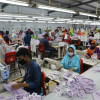Take steps to tackle new US tariffs

We are deeply concerned by US President Donald Trump's reciprocal tariff policy announced on April 2 against all trading partners of the US, including Bangladesh. The policy comes as a shock to the world and signals a shift from the decades-long established global trading pattern. Under the new policy, a base 10 percent tariff will be applied to all foreign goods in the US, while goods from many countries will face higher rates depending on their trade imbalances with the US.
Ironically, it was the US that was the prime mover of the idea of open and free trade by reducing trade barriers through the 1947 General Agreement on Tariffs and Trade (GATT) treaty, which later evolved into the World Trade Organization (WTO) with 166 member nations. But Trump's latest move is a complete reversal of the US's previous position and strikes at the core of globalisation as opposed to protectionism. The policy adds an extra layer of uncertainty to the already complex global trade economy, which has been hit by geopolitical tensions and lingering inflation.
As the world prepares for this new economic reality, Bangladesh must undertake measures to protect its interests. The 37 percent reciprocal tariff the US imposed on Bangladeshi exports will undoubtedly strike the RMG sector hard, as the US has historically been the top destination for our garment products. Last year, $8.4 billion worth of goods were exported to the US and only $2.2 billion were imported from the country, indicating a trade balance in our favour. While some of our main competitors, including China and Vietnam, face higher tariffs than we do, others, such as India, face lower tariffs, which may give them a built-in advantage. This raises concerns about losing the US RMG market to Indian competitors.
However, the government has already made a positive move by initiating a review of tariffs on goods imported from the US. A thorough re-examination of the trade relationship with the US and a re-assessment of the tariff structure, including the removal of tariffs on a select number of US goods, will hopefully send a positive signal to the Trump administration. Experts suggested offering lower tariff offers through the Trade and Investment Cooperation Forum Agreement (Ticfa) to open the doors for further negotiation. However, Bangladesh needs to gear up its negotiation skills and strategies and strengthen ties with key partners through bilateral and multilateral agreements to face the increasingly unpredictable global trade regime. In the long run, Bangladesh needs to diversify both its markets and products and increase efficiency and productivity to retain its competitiveness in the global market. Trump's tariff policy is undoubtedly a shock, but we must not shy away from employing creative and innovative strategies in handling this matter.


 For all latest news, follow The Daily Star's Google News channel.
For all latest news, follow The Daily Star's Google News channel. 






Comments